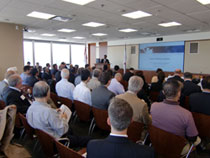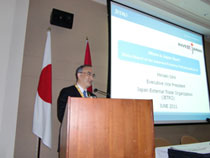Videos
Archives
July 07, 2011
Please browse on your PC
"Japan Engagement Seminar," Held in Five Locations across Canada, Co-sponsored by the Japanese Government: Emphasized the Importance of Businesses with Japan
The Canadian government, together with the Japanese government and JETRO, held seminars titled, the "Japan Engagement Seminar," from June 17 to 24, at five locations across Canada. Three months after the Great East Japan Earthquake, the Canadian government once again stressed the importance of the Japanese market and called on its citizens to maintain a calm and reasonable approach to the problem of radiation, pointing out that some of the media coverage on radiation had lacked accuracy. The Canadian government became the first foreign government to hold briefing sessions on the situation in Japan on its own soil. The five venues welcomed a total of 400-plus participants.
Importance of the Japanese market remaining unchanged
Although the speakers varied from venue to venue, the overall structure of the seminars consisted of Japanese and Canadian government officials, JETRO personnel, and persons from business communities presenting an outlook of "post-earthquake" Japan from their own unique perspectives. Speakers included representatives of the Canadian government (i.e., Mr. Paul Thoppil, minister [commercial] and the senior trade commissioner of the Embassy of Canada to Japan; and others), the Japanese government (Mr. Kaoru Ishikawa, Japan's ambassador to Canada; and others), JETRO (Mr. Hiroaki Ishii, executive vice president of JETRO), and Canadian business leaders (Mr. Kevin Kilbride of Therma-Ray Inc., and others).

Representatives of the Canadian government opened the proceedings by presenting the post-earthquake situation in Japan and the efforts toward recovery, as well as scientific data on radiation doses. Particularly, regarding radiation dosage, the inaccuracies of media coverage were pointed out, and calm and reasonable responses based on accurate information were encouraged. Canadian government officials also touched upon the superiority of Japanese companies, their innovation epitomized by their vast number of patents, Japan's abundant social and human infrastructure, and the resilience of its people, who managed to maintain order even in the face of unprecedented adversity; and they concluded that Japan remains a global economic power and that the Japanese market is essential to Canadian companies.
An appeal made for Japan's safety
Next, Mr. Ishikawa, Japan's ambassador to Canada, gave an explanation on the responses of the Japanese government to the earthquake and the various efforts toward recovery and restoration, as well as making an appeal for Japan's safety.
Mr. Ishii, executive vice president of JETRO, summarized the status of devastation regarding the nuclear power stations after the earthquake, the outlook of the Japanese economy, and the status of the supply chains. Mr. Ishii also mentioned that Canada was the first country in the world to normalize restrictions on food imports from Japan. ( Japan Earthquake: Information for Canadians Regarding Imported Food![]() ) He also explained that investments to Japan remains stable even after the earthquake, indicated that there are many business opportunities for Canadian businesses as a result of restoration demand and the Japanese government's policy to attract foreign investments, and he expressed his hope for the strengthening of economic ties between the two countries.
) He also explained that investments to Japan remains stable even after the earthquake, indicated that there are many business opportunities for Canadian businesses as a result of restoration demand and the Japanese government's policy to attract foreign investments, and he expressed his hope for the strengthening of economic ties between the two countries.

As a specific example of investments in Japan after the earthquake, Mr. Ishii mentioned the remarks by the CEO of Belgium's Umicore, a manufacturer of lithium-ion battery materials.The CEO presented Umicore's decision to "retain its business functions in Tokyo, as it had until then, wbased on scientific data."
He presented few more examples, including Magna, Canada's largest automobile parts manufacturer, announcing on May 18, 2011 that they would commence production in Japan of the soft-top roof system for Nissan's Murano. Also, he mentioned another example of Canadian Solar, Inc., a manufacturer of crystalline solar cells, which had been responding to increasing demand in Japan since 2009, announcing on April 8, 2011 that it would sponsor a Japanese pro baseball team and further establish itself in Japan.
Recounting experiences of entering the Japanese market
Subsequently, representatives of the Canadian government, provincial governments, and government-affiliated financial institutions outlined assistance schemes for entry into the Japanese market and presented numerous government programs designed to encourage companies to set up operations in Japan.
In the panel discussion of companies with experience operating in Japan, many expressed the need for "patience" when entering the Japanese market. Japanese companies tend to take time over the due diligence process when starting their businesses with foreign companies. The panelists agreed that there was a certain lack of understanding of the Japanese market on the Canadian side but efforts should also be made on the Japanese side to clarify their specifications and quality standards at the start of the negotiations and present their conditions to their counterparties in a clear and comprehensible way.
On the other hand, many also agreed that once a relationship had been established, business with Japan tended to last long. Examples of special considerations and business practices required to maintain smooth communications with Japanese companies were also relayed.
It was also mentioned that there is an increasing demand for timber, temporary housing, and mineral water from Canada since the earthquake.
Embassy of Canada to Japan: Calm responses even after the earthquake
While a number of representatives of foreign embassies fled Tokyo after the earthquake, the Canadian embassy stayed in Tokyo and even temporarily increased its number of staff in order to handle the increased operations, including confirming the safety of expatriates in Japan.
Although the Japanese government has been conducting briefing sessions around the world, such as in Asia, the U.S., and Europe, this seminar was brought about through the strong initiative of the Embassy of Canada to Japan. This marked the only instance where a foreign government took the initiative to present Japan's situation on its own soil and is indicative of Canada's attitude of valuing Japan and its calm response to the earthquake.
The seminars were held in five locations: Halifax, Nova Scotia (June 17); Montreal, Quebec (June 20); Toronto, Ontario (June 21); Calgary, Alberta (June 23); and Vancouver, British Columbia (June 24). At each venue, the seminar attracted a great deal of interest mainly among Canadian companies, as indicated by the 130 participants in Vancouver and the 90 in Montreal.



